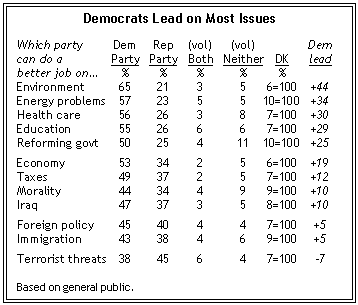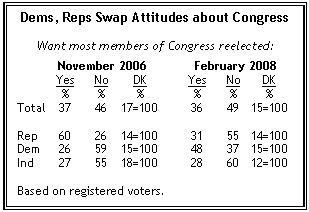The Democratic Party holds a double-digit advantage over the GOP on nine of 12 issues tested, including dealing with the economy, making wise decisions about the war in Iraq, and improving morality in this country.

Majorities say the Democrats can better deal with the economy (53% vs. 34%) and with the nation’s energy problems (57% vs. 23%). The Democratic Party has also opened even larger leads on traditional Democratic strengths like education (55% vs. 26%), health care (56% vs. 26%), the environment (65% vs. 21%), and government reform (50% vs. 25%).
On the environment, even many Republicans believe the Democratic Party, rather than their own party, can better handle the issue. More than four-in-ten Republicans (44%) say the Democratic Party could do a better job of protecting the environment, with about the same percentage of Republicans saying the GOP could do better (43%).
The public also gives the Democrats the edge on issues on which the Republican Party has often held the advantage. Fully 44% favor the Democratic Party when it comes to improving morality in this country, compared with about a third (34%) who favors the GOP. And on making wise decisions about foreign policy, slightly more now say the Democrats can do a better job than the Republicans (45% vs. 40%).
On only one of the 12 issues tested, dealing with terrorist threats at home, is the Republican Party trusted to do a better job: 45% favor the GOP and 38% favor the Democrats. But the GOP advantage has narrowed considerably over the last six years. In January 2002, the Republican Party led the Democratic Party by 30 percentage points on dealing with terrorist threats. The Republican lead had been cut in half by summer of 2004, and it stands at just seven percentage points in the current poll.
Early Look at Anti-Incumbent Sentiment
Overall, American voters’ opinions about whether most members of Congress should be reelected have hardly budged since November 2006, just prior to the midterm election in which Democrats gained the majority in both chambers. About half of voters (49%) say they do not want most members returned to Washington, while 36% say most representatives should keep their jobs.

However, attitudes have shifted dramatically among Republicans and Democrats, reflecting the shift in partisan control of Congress. In November 2006, six-in-ten Republicans said they wanted most members of Congress to be reelected. That percentage has fallen by about half — to 31% — in the current survey. Before the 2006 midterms, only about a quarter of Democrats (26%) wanted most representatives to keep their seats; currently, nearly half of Democrats (48%) say they want most Congress members to stay in place. During both surveys, solid majorities of independents expressed the view that most congressional representatives should not be reelected.
As is typically the case, far more voters say they want to see their own member of Congress reelected than say that most members should be reelected. Currently, 60% say they would like to see their own representative reelected, up slightly from the end of the 2006 campaign (55%).
When it comes to whether their own Congress member should be reelected, Democrats have become notably more positive. Currently, 66% favor their own representative’s reelection, up from 52% in November 2006. More independents also say they would like their representative to be reelected (53% now, 45% in November 2006). There has been no significant change in attitude among Republicans; at both points, more than six-in-ten Republicans wanted their own Congress member retained.